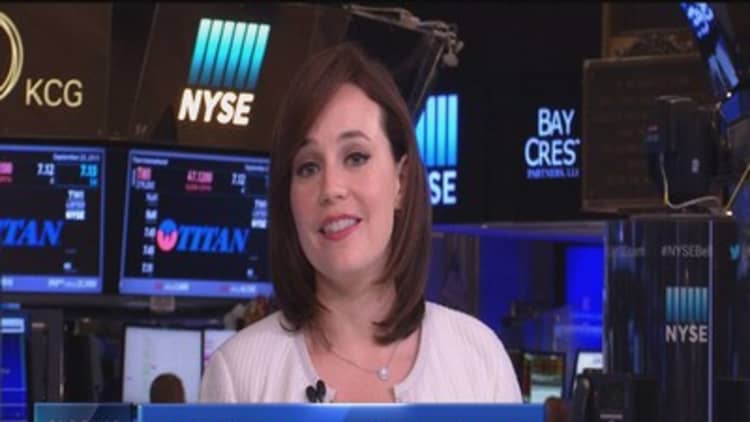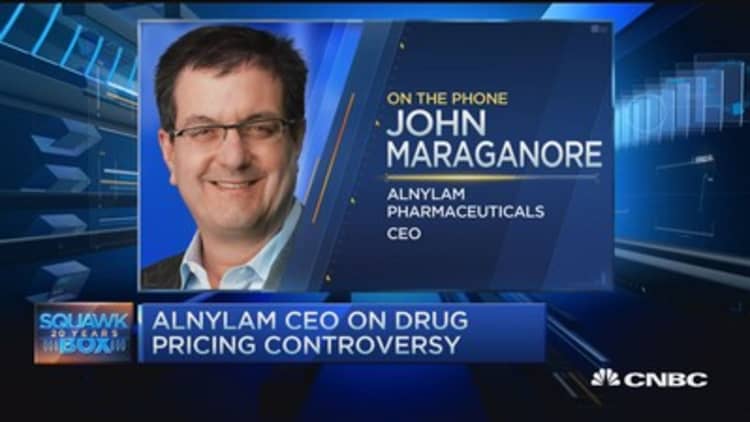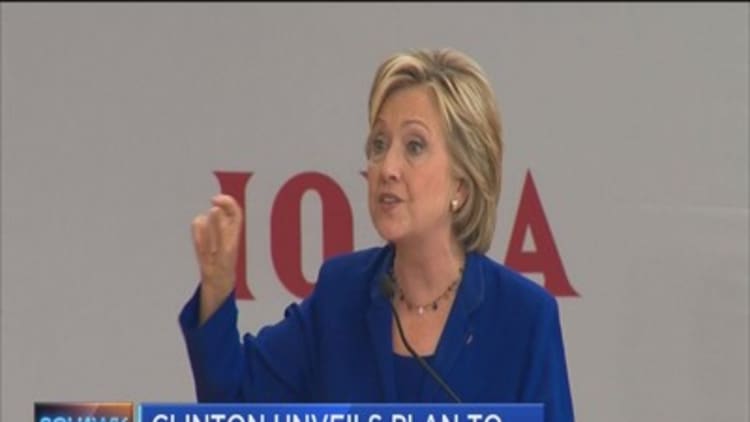


The heat remained on biotech and pharmaceutical companies Monday as drug-pricing strategies remained under close scrutiny.
Valeant shares tumbled nearly 14 percent after Congressional Democrats pressed a Republican committee chairman to subpoena the drugmaker to turn over documents related to the pricing of Nitropress, a congestive heart failure treatment, and Isuprel, another heart drug. The company purchased the rights to both drugs and immediately hiked prices, the letter said.
Valeant is only the latest drugmaker being eyed over pricing practices. Turing Pharmaceuticals CEO Martin Shkreli was lambasted last week by medical groups, a presidential candidate and his own industry for raising the price of a 62-year-old drug by 5,000 percent.
He reversed course under pressure Tuesday night, but not before the national attention struck fear into the hearts of biotech investors over increased scrutiny of drug prices, sending stocks plummeting.
Turing may have been an egregious example, but it's not the only one raising eyebrows for skyrocketing price tags. Bernstein analyst Ronny Gal pointed out many companies ratchet up drug prices when the market presents an opportunity.
"They take drugs that have largely been underpriced before—or that's the way they'd call it," Gal said in a telephone interview. "They buy a drug that does not have good alternatives and they raise the price sky-high. And because it's very hard to say no to those patients; because there's no alternative, people cover this."
Gal pointed to three examples: Jazz Pharmaceuticals' drug Xyrem, Questcor's Acthar and Mylan's EpiPen.
All three of these stocks were trading lower Monday, with Jazz and Mylan down 8 percent and Mallinckrodt, the parent of Questcor, down 11 percent. This was against broader selling in the sector. The iShares Nasdaq Biotechnology ETF fell 7.3 percent.
"We believe it is critical to hold drug companies to account when they engage in 'a business strategy of buying old neglected drugs and turning them into high-priced' 'specialty' drugs,' " the Democrats wrote in the letter sent to House Committee on Oversight and Government Reform.
Jazz Pharma's Xyrem
Jazz, an Ireland-domiciled company, acquired Xyrem in 2005 in its $122.6 million purchase of Orphan Medical. The drug was approved in 2002 for daytime sleepiness and sudden attacks of muscle weakness, or cataplexy, in people with the sleep disorder narcolepsy.
The company reported revenue from Xyrem of $29 million in 2006, the first full year after its acquisition. Last year, Jazz posted Xyrem revenue of $778.6 million.
While the company said it's expanded the number of patients the drug treats, the cost also increased an average of 29 percent a year from 2011 to 2015, according to data distributed this week by Evercore ISI analyst Mark Schoenebaum.
Jazz didn't immediately comment.
Questcor's Acthar
H.P. Acthar Gel was initially approved in 1952, the year before Turing's Daraprim, the subject of this week's controversy. It treats infantile spasms and exacerbations of multiple sclerosis in adults, among other indications, and its price, The New York Times reported in 2012, hopped one day in 2007 to $23,000 a vial, from $1,650.
The increase attracted scrutiny, but not enough to stop Questcor from continuing to raise the price. Between February 2007 and June 2015, data from Bernstein show, the drug's cost rose by more than 19 times.
Why don't insurers fight back? Gal said the company's developed a strategy to usher the drug through the reimbursement process.
"The way Acthar is sold is they basically go through an exception process," Gal said. "The doctor would use basically everything else before Acthar and then would use that when the patient ran out of other options. The company has a specialty person they hire that does as much of the paperwork for the doctor as they can, to work through the insurance company's exception process to get the drug approved."
Questcor was acquired by Mallinckrodt Pharmaceuticals last year for $5.6 billion.
"Physicians carefully weigh therapy choices—some less expensive than Acthar, some more expensive—in determining the appropriate treatment for their patients," said Rhonda Sciarra, a spokeswoman for Mallinckrodt. "As a responsible drug company, Mallinckrodt offers patient assistance programs to facilitate appropriate access to the drug, and has donated several hundred million dollars' worth of Acthar to patients in need."
Mylan's EpiPen
EpiPen, used in emergency treatment for life-threatening allergic reactions, is sold by Netherlands-based drugmaker Mylan. The price, according to data from Evercore ISI, increased 27 percent a year, on average, from 2011 to 2015, to more than $300 each dose.
Meanwhile, prescriptions for EpiPen rose 9.5 percent, on average, each year from 2011 to 2014, according to data from IMS Health. Sales in that time, the data show, rose an average of 42 percent a year, to more than $1 billion.
Mylan spokeswoman Nina Devlin said both sets of numbers are "higher than the actual numbers," but she declined to provide specifics.
The company added that it doesn't set the final retail cost of its products charged to patients, as this is often determined by the insurance coverage of the patient. Also, the company has programs to make the drug more accessible to some patients, including some that provide it at no cost.
Those programs, coupled with the company's outreach, has resulted in a 67 percent increase in the number of EpiPen patients over the past seven years, Mylan said.
"Mylan has worked tirelessly over the past years advocating for increased anaphylaxis awareness, preparedness and access to treatment," Devlin said. "As the leaders in this space, our efforts are aimed at benefiting those living with life-threatening allergies, and we take this leadership position seriously."
Many drug companies offer similar programs, which assist patients with insurance coverage in paying their co-payments.
"It's very hard to tell parents you can no longer get EpiPen," Bernstein's Gal said of the price increase. "You try to do that as an insurer."
Even with the rising number of patients and price, EpiPen, whose brand has become synonymous with allergies, isn't on the list of the top-grossing drugs in the U.S. That list is reserved for medicines like Gilead's Sovaldi and Harvoni, for hepatitis C, Otsuka's Abilify, for depression, and AbbVie's Humira, for rheumatoid arthritis. Each brought in more than $7 billion in 2014 sales in the U.S. alone, IMS data show.
The focus on drug prices, though, is only likely to intensify as the presidential election heats up—another reason Turing's Shkreli has found himself an industry pariah.
(Update: This story, originally published Thursday, was updated to include news tied to Valeant Pharmaceuticals. Comments from Mylan were added Thursday.)
(CORRECTION: An earlier version of this story contained an image with an incorrect caption.)




